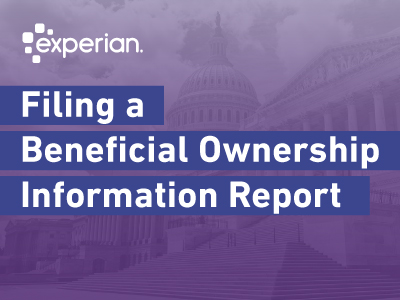Business Credit Education
articles and videos about business credit education
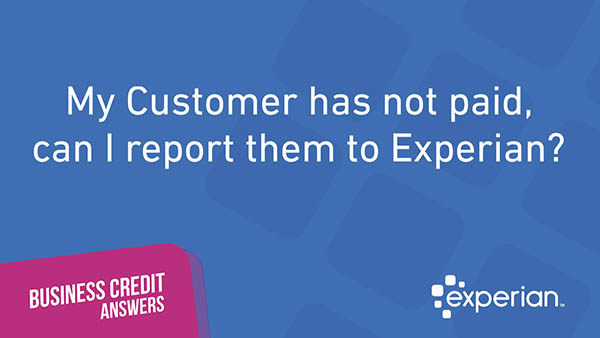
We get this question on the Small Business Matters blog quite often — "How can I report my customers' data to credit bureaus like Experian?” Many small business owners have questions about how to report data to credit bureaus as a business. So we invited Robbin Miske-Palmer from our Data Sourcing team to explain how that works, and what you can do as a business owner to give your customers the credit they deserve. Full File Reporting Many small businesses misunderstand that Experian requires reporting on all customer accounts, not just individual delinquent customers. This "full file reporting" benefits both businesses and their customers. Benefits for Businesses Improved Customer Creditworthiness: Reporting positive payment history helps customers qualify for better credit terms, encouraging their growth and potential spending with your business. Early Detection of Delinquency: Monthly reporting automatically reflects late payments, enabling early intervention to resolve issues and potentially avoid bad debt. Enhanced Vendor Reputation: Reporting demonstrates responsible credit management, fostering trust with other businesses and potential partners. Benefits for Customers Accurate Credit Reports: Reporting ensures accurate credit reports, reflecting good payment habits and contributing to higher credit scores. Access to Credit Opportunities: Positive credit history facilitates access to trade credit, loans, and other financial resources necessary for business growth. Encouragement of Responsible Credit Management: Reporting incentivizes customers to maintain good credit standing, benefiting their overall financial health. Getting Started with Experian Reporting Reporting business data to Experian is free, but requires meeting certain criteria: Membership Approval: Businesses need to apply and agree to Experian's terms and conditions. Monthly Full File Reporting: Timely submission of encrypted data files containing information on all customer accounts is mandatory. Standardized Format: Data files must follow a consistent format every month, simplifying the reporting process. Additional Resources Visit our website for detailed instructions and information on Experian business data reporting. Note that this is specific to reporting on businesses, not individuals. Reporting your customer's business data to Experian offers significant advantages for both your business and your customers. By facilitating responsible credit management and ensuring accurate credit information, this practice fosters a healthy business environment for everyone involved. Links: How to Report to Credit Bureaus as a Business Reporting your customers' business data is free but does require credentialing (Membership) approval. Click here to find information on reporting client/customer data to Experian. Please have ready the following information when you contact Experian - legal company name, business phone number, company address, contact email address, and estimate on the number of businesses to be reported. Note: this is for reporting businesses only, not individuals. If you need to know how to report consumer data to Experian, click here. The following is a lightly-edited transcript of our interview. Gary: And so Robin could you tell us a little bit about what you do here at Experian? Robbin: I'm in the data sourcing department and one of our main objectives is to help businesses onboard to Experian, to be able to report their data, their business data to Experian. Gary: One of the questions I wanted to ask you and what we get asked about a lot on our blog and on social media, is from small business owners and that is how to report data to credit bureaus as a business. And, one to one, I think there may be some misconceptions about how Experian handles that, and I was wondering if you had any feedback on that question that we could help them with. Robbin: Absolutely. So typically, we'll be contacted by a business looking to report just one particular tradeline. But for reporting business data to Experian, it is a full file reporting. And what that means is that you report on all of your accounts. So, with those good accounts, you report those, delinquent, slow pay. And the reason that you do that versus one particular account is that all of your businesses get the advantage of being reported. Robbin: So, if you are a small business, having your vendors report on you does affect your credit report. So, if you're paying as agreed, we want to certainly get that information on the credit report, so you can help those businesses that you work with. And, if you have to look at your slow-paying customers, you certainly want to be able to catch them sooner than later. So being able to report that full file, once they become delinquent you have that opportunity to speak with them and get them back on track since this is going to be something that's shared with the credit bureau. Gary: So, if they're reporting in an automatic way, let's say on a monthly basis to Experian, that transaction that shows the original invoice going out and the fact that it's 90 days or 60 days past due, that's automatically being reflected then in the data. Am I right? Robbin: Yes. Gary: And if the business owner at that point they want to get paid is it then up to commercial collections to go out and get that payment made? Robbin: They can certainly use those services, and Experian does accept collections data as well as trade data, but they also have the opportunity to discuss with their clients to say, "Hey, we do report this information to Experian, we want to be good stewards of your information, make sure that information gets to the credit report." Gary: What I got from your last statement was that with the full file reporting, that you know there are positives and negatives too for the business owner. The customers of your business are getting the credit that they deserve, right? Because you know, if they're paying you on time that's then being reflected in their business credit score. Robbin: Absolutely, and it's a benefit to the vendor to report that information because as their customers grow, and are able to access trade or other means of credit, they're able to grow. So, you certainly want to encourage their growth so that they can spend more with your vendor. Gary: Okay. Excellent. So now, if I'm a business owner, and I have not been reporting to Experian as yet, but I want to. What's their course of action, how do they start? Robbin: It's free to report business data to Experian, but we do have some guidelines that we have to meet. So, they do have to be a customer of Experian, which means there's an application and an agreement that must be signed. It is a monthly data reporting of that full file. You must be able to commit to sending that data to us in an encrypted fashion. And we have the tools already built to be able to do that. We just need your commitment that you're going to send the layout, format, and file, once a month. That layout format stays the same each month. Certainly, you're going to be adding customers, or somebody gets to a final status like they have paid in full, or they're no longer a customer you can report them through that final status, but it should be a monthly reporting that comes to us every month the format and layout stays the same. Gary: Excellent. Well, I want to thank you very much for taking time out today to talk to us about this Robbin and look forward to another opportunity to chat about data with you.
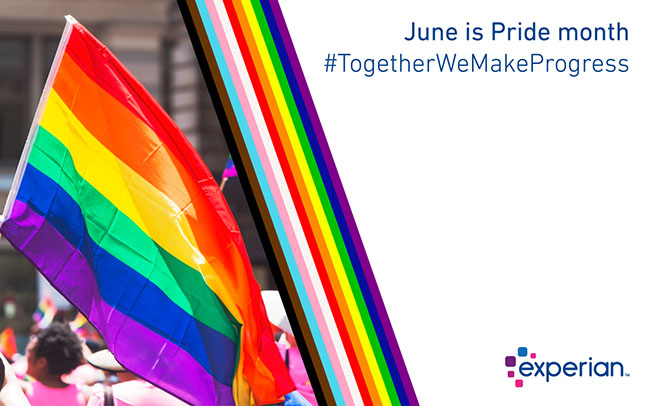
Experian is proud to include people of all genders on our team. In fact, Experian has made great strides in being a premier LGBTQ+ friendly workplace. For the 4th consecutive year, Experian North America has achieved a 100% rating on the Corporate Equality Index by the Human Rights Campaign Foundation. Fortune and Great Place to Work have named Experian North America as one of the Best Workplaces for Diversity. These designations reflect the commitment we've made to not only hiring LGBTQ+ people, but elevating them to high levels within the company, and welcoming them to "bring their whole selves to work" each day. Hear from a few Experian employees about what they love about working here! My Experian family also gets to know the "real me" For Grace, bringing her whole self to work at Experian means that she gets to fully and authentically be exactly who she is. "The same Grace that my friends, family and people outside of work get to know, my Experian family gets to know also," she said. "And something that makes me so proud is that I not only get to make impacts from a business perspective in my sales role, I get to make an impact here on the employees through my Pride leadership role. How cool is that?!" "At Experian, all your identities are seen and valued" Jose (he, him, his) is a DE&I engagement manager for Experian, and is proud to work for Experian, he said, because "they recognize me in all my identities, especially my gay identity. This week is actually Pride week at Experian, and we are having such a great week with all the activities planned for all our employees. I am also fortunate enough to be on our steering committee, to help navigate and instruct what we are doing for our LGBTQ+ community and allies at Experian. So come join us, and learn more about what we're doing as a company internally and externally," Jose said. "Experian has created a LGBTQ+ friendly workplace where your identities don't have to be separate" Emily joined Experian a little over six months ago and did so because of our diverse and inclusive culture. She feels she can bring her whole self to work, she feels more relaxed and present with her co-workers. "I grew up in the 70s and 80s in Oklahoma. I didn't ever think it was possible to have the life I wanted, because I didn't see anyone living that life," she said. "Things have changed a lot since then. But I think people of my generation tend to have this idea that you don't bring anything "personal" to work, because at work you have this "professional" persona, and that's different than the person you are with your friends and family. Experian has dared to envision, and create, a workplace where those identities don't have to be separate."
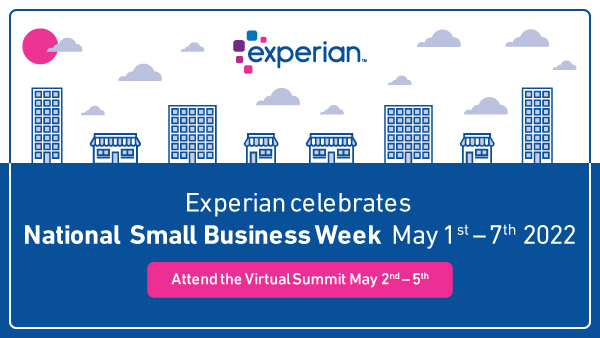
Experian is excited to be celebrating National Small Business Week - please set your calendar for the Virtual Summit May 2nd - 5th.
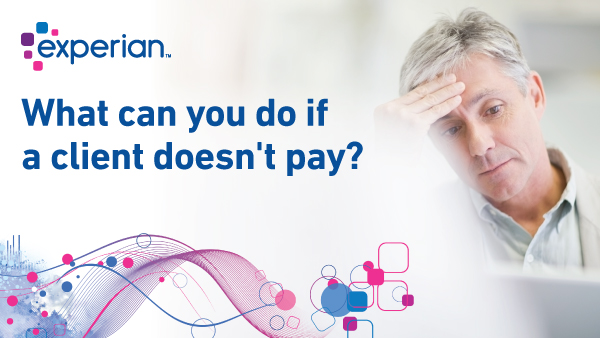
Starting a solo business is financially empowering, whether you do freelancing to earn extra income or build a full-time enterprise. But along with greater financial independence comes the risk of not being paid. Clients may pay late; some may not pay at all. When your client doesn't pay, what can you do? Late payments from clients happen for a variety of reasons. How you respond can determine whether you get your money—or keep the client. Reacting to a brief delay with the threat of a lawsuit, for example, could damage your client relationship needlessly. On the other hand, failing to follow up could result in hundreds of lost work hours and financial problems for you if your client never pays their bill. The following steps begin with simple reminders and escalate to more significant action. Keep reading for tips on how to prevent missed payments in the future. 1. Resend Your Invoice If there’s been a simple problem—the invoice got lost, the client’s bookkeeper is on vacation—resending the invoice acts as a reminder. Send one as early as the day after a payment was due if necessary. 2. Contact the Client If resending an invoice doesn’t trigger a response, respectfully reach out to your client with an email or a phone call and inquire about payment. They may tell you a payment has already been sent or that one will be issued soon. Make a note of when you should expect payment, along with a calendar alert to follow up again if payment doesn’t arrive as promised. 3. Stop Working for the Client If you sent the client a new invoice and spoke with them about the late payment by phone, it may be time to step up your actions if payment still hasn’t arrived as they said it would. If you’re continuing to do work for them, consider pausing until you receive payment. Continuing to work may just result in a bigger bill—one that you aren’t sure is ever going to be paid. It also takes time away from paying clients. Letting your client know that you can’t continue working without payment may prompt them to act quickly. Are you working on a product, such as a book manuscript or custom cabinetry? Don’t deliver it until you have payment in hand. 4. Send a Debt Collection Letter You can have an attorney prepare a debt collection letter for you or find a templated letter to modify online. A debt collection letter acts as formal notice and documentation that your client owes you money, including how much they owe and when it was due. In your debt collection letter, you might specify whether you’d be willing to set up a payment plan to help your client get back on track or let them know you plan to initiate formal debt collection action. Depending on your client’s reaction or lack thereof, you can send more than one of these letters, escalating the matter’s urgency. 5. Consider Your Next Steps It’s possible your client will come through with payment at any of the previous steps. But if you’ve made every effort to collect payment from your client and they still refuse to pay, you can try taking them to small claims court to recover your money. Be sure to hold on to any documentation, such as debt collection letters, asking the client to pay. You’ll need to prove you are owed the amount you claim by providing contracts, letters, receipts or other information noting the agreed upon amount for the job. You’ll also need to find out what the small claims dollar limit is in your state. You can also look into turning over the debt to a collection agency to collect payment. However, you’ll only see only a fraction of your payment if collections are successful because the agency will take a percentage of the amount collected (which may or may not be equal to what was owed. You may also decide simply to move on. The time and stress required to recoup your loss may not be worth it. If you’ve lost tangible goods, you may be able to write off your loss on your taxes. However, you won’t be able to deduct an unpaid balance for services—the IRS doesn’t allow it. How to Avoid Not Getting Paid in the Future It’s impossible to completely avoid the risk of being stiffed. Even a good client can suffer an unexpected financial downturn or a sudden life crisis, and it can be hard to know whether a prospective client is creditworthy. You can’t eliminate risk entirely but you can reduce it by following a few basic tips: Sign a contract with a payment schedule. Whether it’s prepared by the client or by you, a contract spells out the scope and cost of the work you’re proposing. It can also include a payment schedule with clear deadlines and late payment fees (or discounts for early payment). Especially with a new client, get paid as much as possible up front, or consider breaking the payments up to coincide with specific work milestones. Vet new clients before you take them on. Has a new client been referred to you by someone you know? Have they been in business for a long time or are they just starting? Do they have references you can call? If you’re unsure about a new client, think about the work you agree to as having a credit limit attached to it: Start with a $500 project then increase the size of the projects if things go well. Speaking of credit, you can also check a prospective client’s business credit report. The information in Experian's business credit reports is continually updated, always accessible and includes the Experian business credit score, credit trade payment information, corporate registration, business public records, key personnel, and a lot more. Make it easy for clients to pay. Accepting electronic payments or credit cards may give your clients helpful options to pay on time. You may also consider accepting a payment plan or partial payment from a client who’s having trouble paying an invoice. If you do, though, think twice before accepting future work from them. Building a Stronger Business The more you depend on money from your freelance work, the more critical it is to get paid—in full and on time. When clients pay late or don’t pay, your business and personal finances suffer. You may not be able to meet your business expenses or pay your personal bills. You risk falling behind in monthly credit card and loan payments. You may also have to use business or personal credit to make ends meet while you’re waiting on payments and may be stuck with debt if you’re never paid. Fortunately, most business transactions don’t go this way. By limiting your risk with upfront payments, smaller projects and frequent billing; using contracts that spell out work and payment terms clearly; and following basic steps to collect when payments run late, you can reduce your chances of running into trouble. The risk of lost payments can also motivate you to build a cash cushion for your business—or your personal finances—so a late payment here and there is easier to manage. In these ways, the threat of late payments can make your business and your finances stronger, by making you a smarter business owner. About the author Gayle Sato writes about financial services and personal financial wellness, with a special focus on how digital transformation is changing our relationship with money. As a business and health writer for more than two decades, she has covered the shift from traditional money management to a world of instant, invisible payments and on-the-fly mobile security apps. Gayle began her career as a staff writer for Entrepreneur magazine. As an independent publisher, she edited and produced a series of personal finance magazines for credit union members and THINK, an executive magazine for the credit union industry.
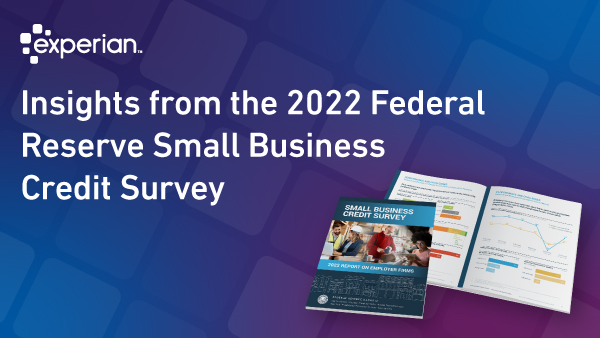
Gary Stockton: In November of last year, the federal reserve banks conducted the Small Business Credit Survey. In all, they surveyed nearly 11,000 small businesses to ask them about their financial condition, whether they had sought financing in the prior 12 months, and what the effect the pandemic had on their business. The results of that survey have just been published in the 2022 Report on Employer Firms. Emily Wavering Corcoran is the Program Manager of the Small Business Credit Survey (SBCS) in the Community Development Department of the Federal Reserve Bank of Cleveland. The SBCS is a national collaboration among the 12 reserve banks of the Federal Reserve System, to gather timely information on small business, economic conditions, financing needs and credit availability. And we're recording this interview on Friday, March 4th, 2022 ahead of the Federal Open Market Committee meeting. Emily, welcome to the Small Business Matters podcast. Emily Wavering Corcoran: Thank you so much, Gary. Glad to be here. Gary Stockton: Well, one of the most heavily impacted small business segments is leisure and hospitality. Could you tell us what you found out about the financial condition of businesses in this sector? Emily Wavering Corcoran: Absolutely. So as you've mentioned in sort of the background you gave about the survey, the SBCS is fielded every fall. The 2021 SBCS, of course, was fielded from September through November, 2021. And it gathered information from over 17,000 small business owners across the country, including nearly 11,000 small businesses with employees. So that's the segment of small businesses that this report in particular focuses on. As you mentioned, the survey provides detailed information on performance and financing conditions from the perspective of small business owners. In addition to the standard questions about business conditions, debt and credit, the 2021 survey included questions about the ongoing effects of the pandemic, including its impact on revenues and employment, operating challenges, including workforce challenges and applications for pandemic related financial assistance. We also, for the second year in a row, included a question asking small business owners about the financial condition of their business, which is what you just referenced. They were given five options to select from. They could say their business was in excellent financial condition, the financial condition was very good, good, fair, or poor. Out of all employer small businesses, 59% were in poor or fair financial condition at the time of the survey, so, fall 2021. Now, when we drill down more deeply, we see that firms owned by people of color, firms with fewer employees, and firms in particular industries, including leisure and hospitality, were most likely to be in fair or poor financial condition. So relative to small businesses in other industries, leisure and hospitality firms were more likely to be in fair or poor financial condition. So three out of four firms in leisure and hospitality. In many ways, this is not surprising, right? Leisure and hospitality includes restaurants, hotels, entertainment venues. So many of those small businesses that were particularly hard hit, especially early in the pandemic. And that shows the persistent impact of that initial hit and trying to weather the pandemic as a firm that really relies on face-to-face contact, on having people come into the business--All of those things really hold for firms in the leisure and hospitality sector. Gary Stockton: More than half of the firms were in fair or poor financial condition at the time of the survey. And nearly all firms faced at least one operation or financial challenge in the prior 12 months. With so much government assistance made available, why do you think so many small businesses are still struggling? Emily Wavering Corcoran: Yeah, I think for this question, it's important to think about the counterfactual. What might SBCS data look like had pandemic related financial assistance not been made available? I don't know the answer to that question, no one does, but the fact that business performance numbers are tempered, and that many small businesses continue to face operational and financial challenges, even with pandemic related financial assistance, suggests that in the absence of that support, aggregate outcomes for small businesses, and of course the resulting SBCS data to measure those outcomes, could have been much worse. Gary Stockton: Can you talk a little about which businesses applied for additional financing vs. those who did not, and some of the reasons why they did not apply? Emily Wavering Corcoran: The Small Business Credit Survey identifies applicants or small businesses that did apply for credit, and non-applicants, or small businesses that did not apply for credit. So we get both sides of the experiences, right? Apply for credit, don't apply for credit. And then we can drill down to more deeply understand both of those sets of firms: firms that did apply, firms that chose not to apply. So 36% of firms did apply for financing. And 64% did not apply for financing. When you look at just that set of non-applicants, firms that did not apply for financing, 46% of those businesses did not apply because they had sufficient financing. So they did not need to apply for a loan or a line of credit because they had ample financing through other streams. Then 14% of that non applicant pool were discouraged, meaning that they did not apply because they believed that they would be turned down. When you look again, one step further, more deeply at those discouraged firms, a majority of those firms, or just over half of those firms, believed they would be turned down because of weak business financials. And then other reasons that those folks cited in the survey were lender requirements, the belief that lenders would not extend financing based on some characteristic of their business; previous denials and bad experiences in the past that made them discouraged about applying again, and missing documentation was also a relatively big factor for folks. Gary Stockton: You mentioned them being concerned about weak financials as a leading reason. Would that be a major concern when seeking government help through the PPP program? Or was it just maybe a confidence issue with that business owner? Emily Wavering Corcoran: I think both. Financials are certainly an important part of the credit application process. And so as we saw, business fundamentals being hard hit through the pandemic, that certainly played out in both folks deciding to apply for credit or not. And then also it played out in some of the outcomes that we saw for folks who did choose to apply for credit. Gary Stockton: Yeah. The other thing that we noticed in the report was that 2021 PPP outcomes were worse than 2019, particularly in that leisure and hospitality sector. And particularly with black and brown businesses, do you know what's going on there? Emily Wavering Corcoran: Yeah. So again, I would point to some of the information in the report about financial condition, about annual revenues and employment. Certain segments of firms being really hard hit, and then that playing out in different ways in terms of credit access. We did, as you point out, we saw both a decline in firms seeking PPP and a decline in firms receiving PPP. The why is an incredibly complex question to answer, right? Definitely not fully answered by SBCS data, but it is at least partially explained by the relatively smaller size of the third round of PPP funding compared to the two prior rounds, as well as additional eligibility requirements for PPP. But again, not fully answered by SBCS data, certainly something that I'm sure additional research will look at in the years to come. Gary Stockton: What was the most surprising thing to you about the 2022 survey? Was there one thing that really stood out to you as, as important? Emily Wavering Corcoran: Good question, but to be honest, “surprised” doesn't quite capture what I felt about any of the survey results as we were digesting the data and really examining things. In many ways, I feel like the survey data add greater nuance and more robust evidence to ongoing narratives about small business hardship and resilience that we've been hearing about and talking about over the last two years at this point. instead of surprise, I would say that the results for me strengthened my resolve to continue collecting and producing this data so that we can continue to have structural information on small business credit experiences. Small business does matter, and of course, small businesses are on the road to recovery, but it appears to be a long and uneven road, but SBCS data will continue to be there as small businesses move forward. Gary Stockton: Well, Emily, I'd like to thank you for sharing your thoughts with our listeners. Where can they learn more about the great work going on at the Federal Reserve Banks? Emily Wavering Corcoran: I love that question. You can learn more about the Small Business Credit Survey in particular at www.fedsmallbusiness.org. I would also encourage your listeners to check out www.fedcommunities.org, which is a website that shares information across the Federal Reserve System on the great work that the Federal Reserve Banks are doing at the community level. Gary Stockton: Emily, thank you very much for your time. 2022 Small Business Credit Survey Note: We recorded this interview on Friday, March 4, 2022.
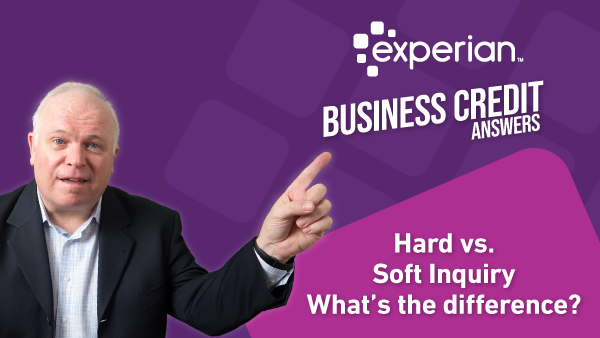
There are two types of credit inquiry, hard and soft. How do hard and soft credit inquiries impact your business credit score? We explain the difference.
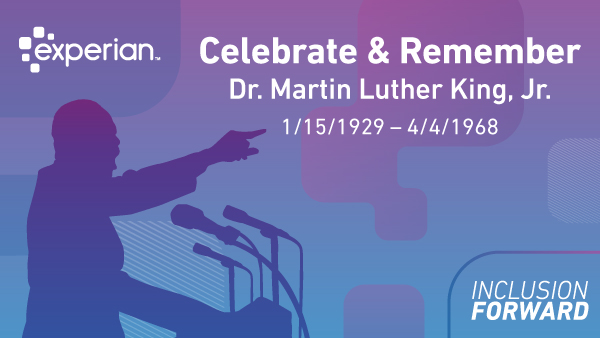
The legacy of Martin Luther King, Jr. is one that has spanned generations and continues to inspire people around the world. The hope he brought with his message of non-violence was a catalyst for change for millions of people, including many of us who work at Experian. We are honored to share what Dr. King's legacy means in our own lives and how we plan to carry his message of courage, strength, and determination into the future. "Love is the Greatest Force in the Universe" "What inspires me about Dr. Martin Luther King, Jr. is the way he was always able to show love, no matter what he was going through," says Chris, VP of Sales at Experian. "Despite threats, despite social injustices, despite assassination attempts on his life--he didn't grab a gun. He didn't teach hate. He taught love. Just like Dr. King, I teach and tell others that no matter what you're going through, or how hard it gets, just show love--genuine love--and it will always work out." His Message of Nonviolent Resistance Gary, Senior Manager, BIS, says the thing that inspires him the most about Dr. Martin Luther King, Jr. was his message about nonviolent resistance, and how it can bring about social change. "A simple but powerful act of boycotting public buses en masse brought about the November 1956 ruling by the Supreme Court that segregation on public buses was unconstitutional," he says. Today I celebrate the life, legacy and message of Dr. Martin Luther King, Jr." "I Can Do Small Things in a Great Way" "His work taught me never to give up hope in the face of despair," says Corliss, Senior Manager, Financial Inclusion, DEI Marketing. "As he said, 'We must accept finite disappointment, but never lose infinite hope.' Dr. King also taught me that we have a role to play to make a difference in this world, and that ordinary people can do extraordinary things. He said, 'If I cannot do great things, I can do small things in a great way.' So thank you, Dr. King, for your legacy of hope, love and reminding us again, that ordinary people can do extraordinary things." "I Have a Dream" Bryan, Social Media Specialist, says King's iconic "I have a Dream" speech has been a huge inspiration for him. "That speech…taught me that if you believe in something, stand up for it. It taught me to be the change that I want to see in the world," he says. "I'm proud and honored to continue his legacy. So, Dr. Martin Luther King, Jr.--you had the dream, and now it's my job to make sure your dream becomes reality." "Dangerous Unselfishness" "I believe it is MY responsibility every day, to use my privilege to ensure Martin Luther King Junior's dream is not buried," says Emily from Business Information Services. "To amplify the voices of people of color who are still not being heard because white people will not stop talking. Today, I will listen, I will learn, and I will practice 'dangerous unselfishness.'" Together, We Make the World a Better Place Taneishia, Account Executive, Software Sales, says that hearing Dr. King's "I Have a Dream" speech as a child encouraged her to dream, to hope, and to believe in something bigger than herself. "His work and his impact is evident in the fact that I, a woman of color, a Black woman, have the opportunity to work for a company like Experian alongside people of all types of ethnicities and backgrounds," she says. "Coming together, we are making Experian and the world a better place." Taking the First Step, Even When You Can’t See the Entire Staircase “When reflecting on the memory of the late, great Dr. Martin Luther King, Jr., there are so many things that I'm struck by,” says Jennifer, Senior Manager, Marketing. “His grace, his humility, and his ability to triumph in the face of adversity. One of the things that he said is that faith is taking the first step, even when you can't see the entire staircase. This resonates with me, because it shows that in times of difficulty and uncertainty, you just have to keep moving forward, taking the first step. Even though you don't know what the end result will be.” “We have an opportunity to make America a better nation.” We are grateful to Dr. King for his tireless efforts towards equality for all people, for his vision of the future that he would hold, but never see. Today we at Experian join people all over the world as we honor his memory, his work and his legacy. "Let us rise up tonight with a greater readiness. Let us stand with a greater determination. And let us move on in these powerful days, these days of challenge to make America what it ought to be. We have an opportunity to make America a better nation."1 Footnotes: 1. From the "Mountaintop Speech," King's last speech on the eve of his assassination, April 3, 1968
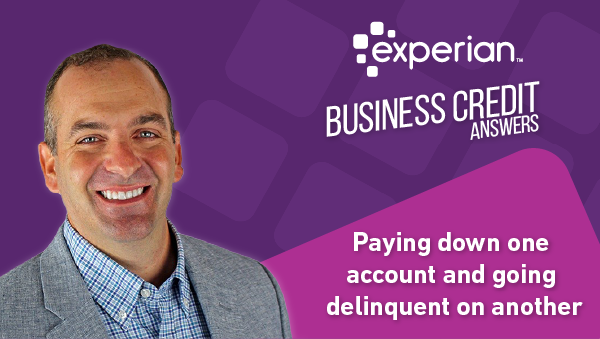
Paying down commercial debt — is paying one account and going delinquent on another a good idea? In this business credit answer, I want to talk with you about paying down commercial debt, and establishing your small business and gaining access to commercial credit. To do this, you need to focus on your commercial credit score. It's just like your personal credit score. You monitor it, you try to get it up, you pay your bills, and you make sure that everything is being reported to the credit bureau. Doing those activities will help your consumer credit score to go up. Same thing for your commercial credit score. It's looking at any type of commercial credit cards that you have, term loans, how you are honoring the debts that are there, and repaying them. This is what a lender uses to establish your repayment behavior and to look at how much additional funding they want to give to your small business. I had a friend that wanted to pay down some of the debt that they had for a small business, and they had two different accounts that had pretty high debt. He was asking me should I just pay down one of those debts, and let the other one go into delinquency for a while and then come back to that one and pay it down? He figured that way he'd have that sense of paying one down quickly and get one out of the way. And then focus on the other one. Well, what I told him was that it's not just a single debt that your credit score looks at. It's over your whole portfolio of debt. And so, missing a payment or pushing a bill to the side can bring your credit score down and sometimes significantly. So, you look at your credit score and you see it go down maybe five or 10 points. With delinquency, it can bring it down up to 30 points. So it's a big drop. As you bring up your credit score, it takes a little while to regain ground you may have lost. So you want to keep that propensity to pay, and that lender view of you in a very positive light. You can check your Experian Business Credit Score by purchasing a one-time copy of your credit report, or by signing up for business credit monitoring, including unlimited access to scores. Read our post on checking your business credit score for more information.
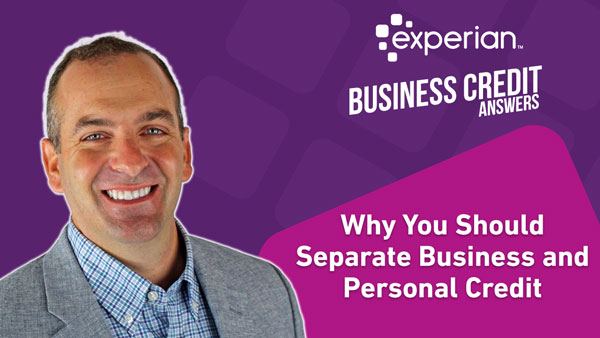
Why it is so important to separate business and personal credit When we look at small business owners like you in the U.S., we know that you are less delinquent on your accounts. You revolve a little bit more of those balances as you go forward, as you're trying to grow your business. And we know that you are more likely to pay your debt because it's tied to your livelihood. And if something is tied to your livelihood, you're more likely to honor it. Well, we want you to honor all your obligations on your consumer and commercial credit. And so to do that, it's better to separate out those two forms of credit. Your two profiles, your business, and your consumer, meaning just your personal credit. So when we look at this, think about it in this way. I have a small business, and with my small business, sometimes I need to buy equipment. But it as a small business owner. I may not have established my commercial credit. I don't have anything on a commercial credit card. I don't have an installment loan through my business. And I want to do it on my consumer credit card. So I go out and I buy this piece of equipment. I put it on my consumer credit card. What that does is add debt to my consumer credit. A lot of times that utilization will be a little bit higher. The debt will be higher. It's a piece of equipment. Generally, it's pretty big. That means my score will go down a little bit. You may come into a life event. So we've had a third kid and my wife says, hey, we need a little bit bigger house. So to do that, we go shopping for a house. But what I have is this piece of equipment on my personal credit, bringing my score down a little bit. That's going to make the cost of my house a little bit higher. And I may not be able to afford the houses that I'd really like. So pulling that piece of equipment, going through a commercial credit facility, getting it on a commercial credit card or an installment loan through my business will bring that debt off of my personal credit and put it under my business, where it should be. That establishes my small business, allows that score on my small business to go up. It also takes a debt load off of my consumer credit, allows that to go up. And so it makes me have a better opportunity to buy a house at a cheaper price, also allows me to build my small business credit. And in doing that, I can gain access to cheaper funds for my business going forward and grow. You can check your Experian business credit score by purchasing a one-time copy of your credit report or by signing up for business credit monitoring, including unlimited access to scores. Read our post on checking your business credit score for more information. Related: What is a good business credit score? How do I check my business credit score? Adding tradelines to build credit for your business
